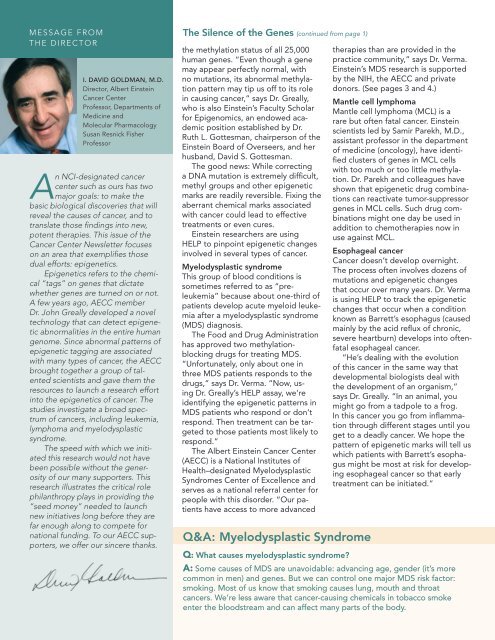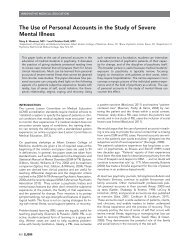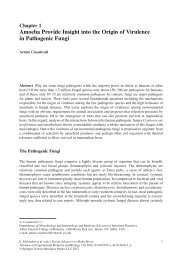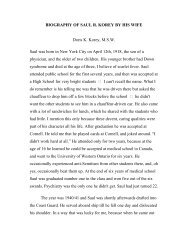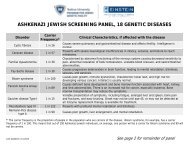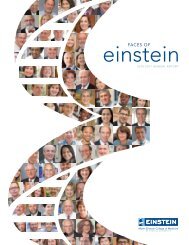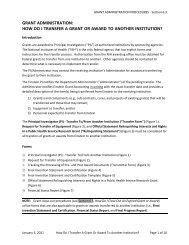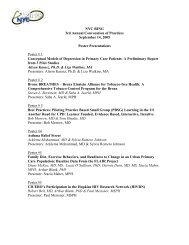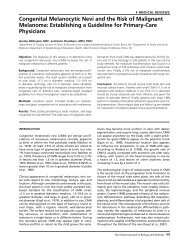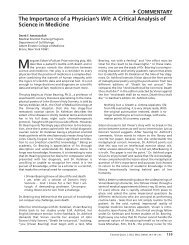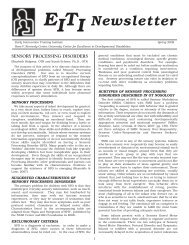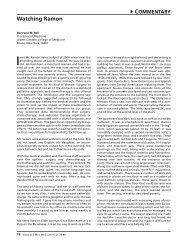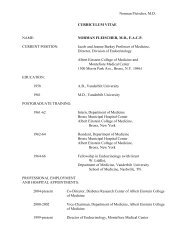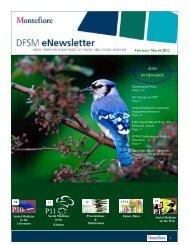An NCI-designated cancer - Albert Einstein College of Medicine
An NCI-designated cancer - Albert Einstein College of Medicine
An NCI-designated cancer - Albert Einstein College of Medicine
You also want an ePaper? Increase the reach of your titles
YUMPU automatically turns print PDFs into web optimized ePapers that Google loves.
MESSAGE FROM<br />
THE DIRECTOR<br />
I. DAVID GOLDMAN, M.D.<br />
Director, <strong>Albert</strong> <strong>Einstein</strong><br />
Cancer Center<br />
Pr<strong>of</strong>essor, Departments <strong>of</strong><br />
<strong>Medicine</strong> and<br />
Molecular Pharmacology<br />
Susan Resnick Fisher<br />
Pr<strong>of</strong>essor<br />
<strong>An</strong> <strong>NCI</strong>-<strong>designated</strong> <strong>cancer</strong><br />
center such as ours has two<br />
major goals: to make the<br />
basic biological discoveries that will<br />
reveal the causes <strong>of</strong> <strong>cancer</strong>, and to<br />
translate those findings into new,<br />
potent therapies. This issue <strong>of</strong> the<br />
Cancer Center Newsletter focuses<br />
on an area that exemplifies those<br />
dual efforts: epigenetics.<br />
Epigenetics refers to the chemical<br />
“tags” on genes that dictate<br />
whether genes are turned on or not.<br />
A few years ago, AECC member<br />
Dr. John Greally developed a novel<br />
technology that can detect epigenetic<br />
abnormalities in the entire human<br />
genome. Since abnormal patterns <strong>of</strong><br />
epigenetic tagging are associated<br />
with many types <strong>of</strong> <strong>cancer</strong>, the AECC<br />
brought together a group <strong>of</strong> talented<br />
scientists and gave them the<br />
resources to launch a research effort<br />
into the epigenetics <strong>of</strong> <strong>cancer</strong>. The<br />
studies investigate a broad spectrum<br />
<strong>of</strong> <strong>cancer</strong>s, including leukemia,<br />
lymphoma and myelodysplastic<br />
syndrome.<br />
The speed with which we initiated<br />
this research would not have<br />
been possible without the generosity<br />
<strong>of</strong> our many supporters. This<br />
research illustrates the critical role<br />
philanthropy plays in providing the<br />
“seed money” needed to launch<br />
new initiatives long before they are<br />
far enough along to compete for<br />
national funding. To our AECC supporters,<br />
we <strong>of</strong>fer our sincere thanks.<br />
The Silence <strong>of</strong> the Genes (continued from page 1)<br />
the methylation status <strong>of</strong> all 25,000<br />
human genes. “Even though a gene<br />
may appear perfectly normal, with<br />
no mutations, its abnormal methylation<br />
pattern may tip us <strong>of</strong>f to its role<br />
in causing <strong>cancer</strong>,” says Dr. Greally,<br />
who is also <strong>Einstein</strong>’s Faculty Scholar<br />
for Epigenomics, an endowed academic<br />
position established by Dr.<br />
Ruth L. Gottesman, chairperson <strong>of</strong> the<br />
<strong>Einstein</strong> Board <strong>of</strong> Overseers, and her<br />
husband, David S. Gottesman.<br />
The good news: While correcting<br />
a DNA mutation is extremely difficult,<br />
methyl groups and other epigenetic<br />
marks are readily reversible. Fixing the<br />
aberrant chemical marks associated<br />
with <strong>cancer</strong> could lead to effective<br />
treatments or even cures.<br />
<strong>Einstein</strong> researchers are using<br />
HELP to pinpoint epigenetic changes<br />
involved in several types <strong>of</strong> <strong>cancer</strong>.<br />
Myelodysplastic syndrome<br />
This group <strong>of</strong> blood conditions is<br />
sometimes referred to as “pre-<br />
leukemia” because about one-third <strong>of</strong><br />
patients develop acute myeloid leukemia<br />
after a myelodysplastic syndrome<br />
(MDS) diagnosis.<br />
The Food and Drug Administration<br />
has approved two methylationblocking<br />
drugs for treating MDS.<br />
“Unfortunately, only about one in<br />
three MDS patients responds to the<br />
drugs,” says Dr. Verma. “Now, using<br />
Dr. Greally’s HELP assay, we’re<br />
identifying the epigenetic patterns in<br />
MDS patients who respond or don’t<br />
respond. Then treatment can be targeted<br />
to those patients most likely to<br />
respond.”<br />
The <strong>Albert</strong> <strong>Einstein</strong> Cancer Center<br />
(AECC) is a National Institutes <strong>of</strong><br />
Health–<strong>designated</strong> Myelodysplastic<br />
Syndromes Center <strong>of</strong> Excellence and<br />
serves as a national referral center for<br />
people with this disorder. “Our patients<br />
have access to more advanced<br />
Q&A: Myelodysplastic Syndrome<br />
therapies than are provided in the<br />
practice community,” says Dr. Verma.<br />
<strong>Einstein</strong>’s MDS research is supported<br />
by the NIH, the AECC and private<br />
donors. (See pages 3 and 4.)<br />
Mantle cell lymphoma<br />
Mantle cell lymphoma (MCL) is a<br />
rare but <strong>of</strong>ten fatal <strong>cancer</strong>. <strong>Einstein</strong><br />
scientists led by Samir Parekh, M.D.,<br />
assistant pr<strong>of</strong>essor in the department<br />
<strong>of</strong> medicine (oncology), have identified<br />
clusters <strong>of</strong> genes in MCL cells<br />
with too much or too little methylation.<br />
Dr. Parekh and colleagues have<br />
shown that epigenetic drug combinations<br />
can reactivate tumor-suppressor<br />
genes in MCL cells. Such drug combinations<br />
might one day be used in<br />
addition to chemotherapies now in<br />
use against MCL.<br />
Esophageal <strong>cancer</strong><br />
Cancer doesn’t develop overnight.<br />
The process <strong>of</strong>ten involves dozens <strong>of</strong><br />
mutations and epigenetic changes<br />
that occur over many years. Dr. Verma<br />
is using HELP to track the epigenetic<br />
changes that occur when a condition<br />
known as Barrett’s esophagus (caused<br />
mainly by the acid reflux <strong>of</strong> chronic,<br />
severe heartburn) develops into <strong>of</strong>tenfatal<br />
esophageal <strong>cancer</strong>.<br />
“He’s dealing with the evolution<br />
<strong>of</strong> this <strong>cancer</strong> in the same way that<br />
developmental biologists deal with<br />
the development <strong>of</strong> an organism,”<br />
says Dr. Greally. “In an animal, you<br />
might go from a tadpole to a frog.<br />
In this <strong>cancer</strong> you go from inflammation<br />
through different stages until you<br />
get to a deadly <strong>cancer</strong>. We hope the<br />
pattern <strong>of</strong> epigenetic marks will tell us<br />
which patients with Barrett’s esophagus<br />
might be most at risk for developing<br />
esophageal <strong>cancer</strong> so that early<br />
treatment can be initiated.”<br />
Q: What causes myelodysplastic syndrome?<br />
A: Some causes <strong>of</strong> MDS are unavoidable: advancing age, gender (it’s more<br />
common in men) and genes. But we can control one major MDS risk factor:<br />
smoking. Most <strong>of</strong> us know that smoking causes lung, mouth and throat<br />
<strong>cancer</strong>s. We’re less aware that <strong>cancer</strong>-causing chemicals in tobacco smoke<br />
enter the bloodstream and can affect many parts <strong>of</strong> the body.


